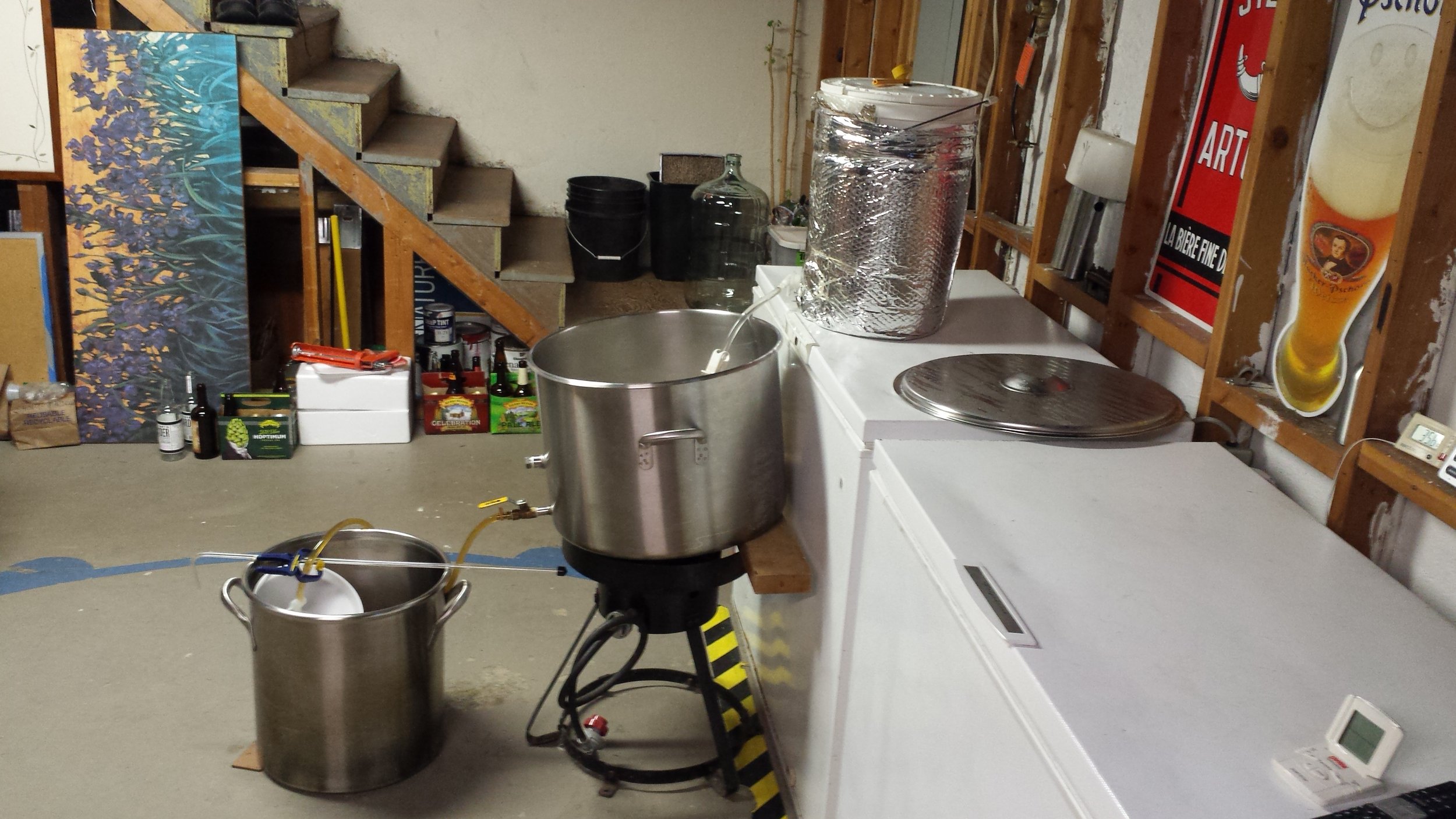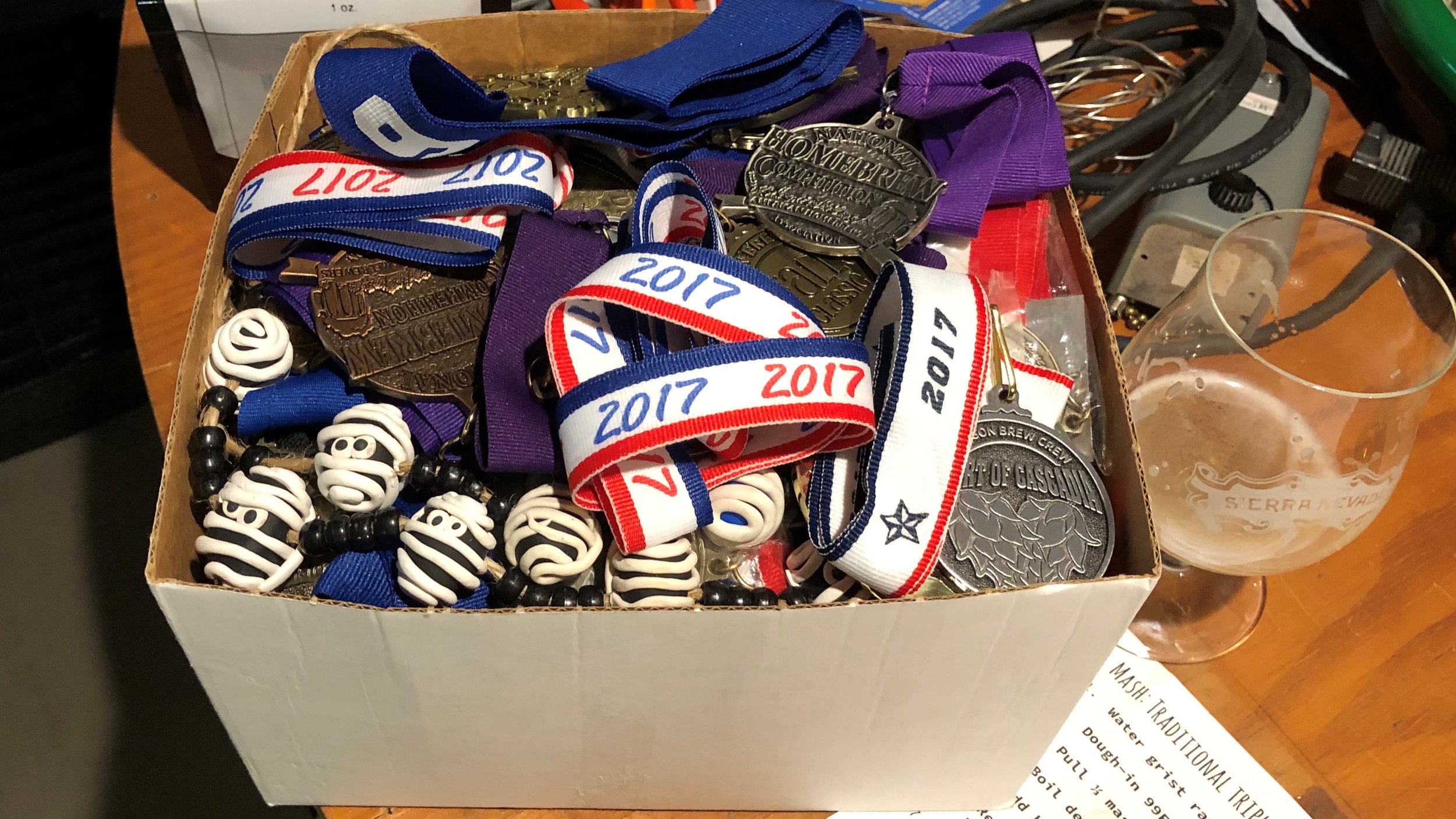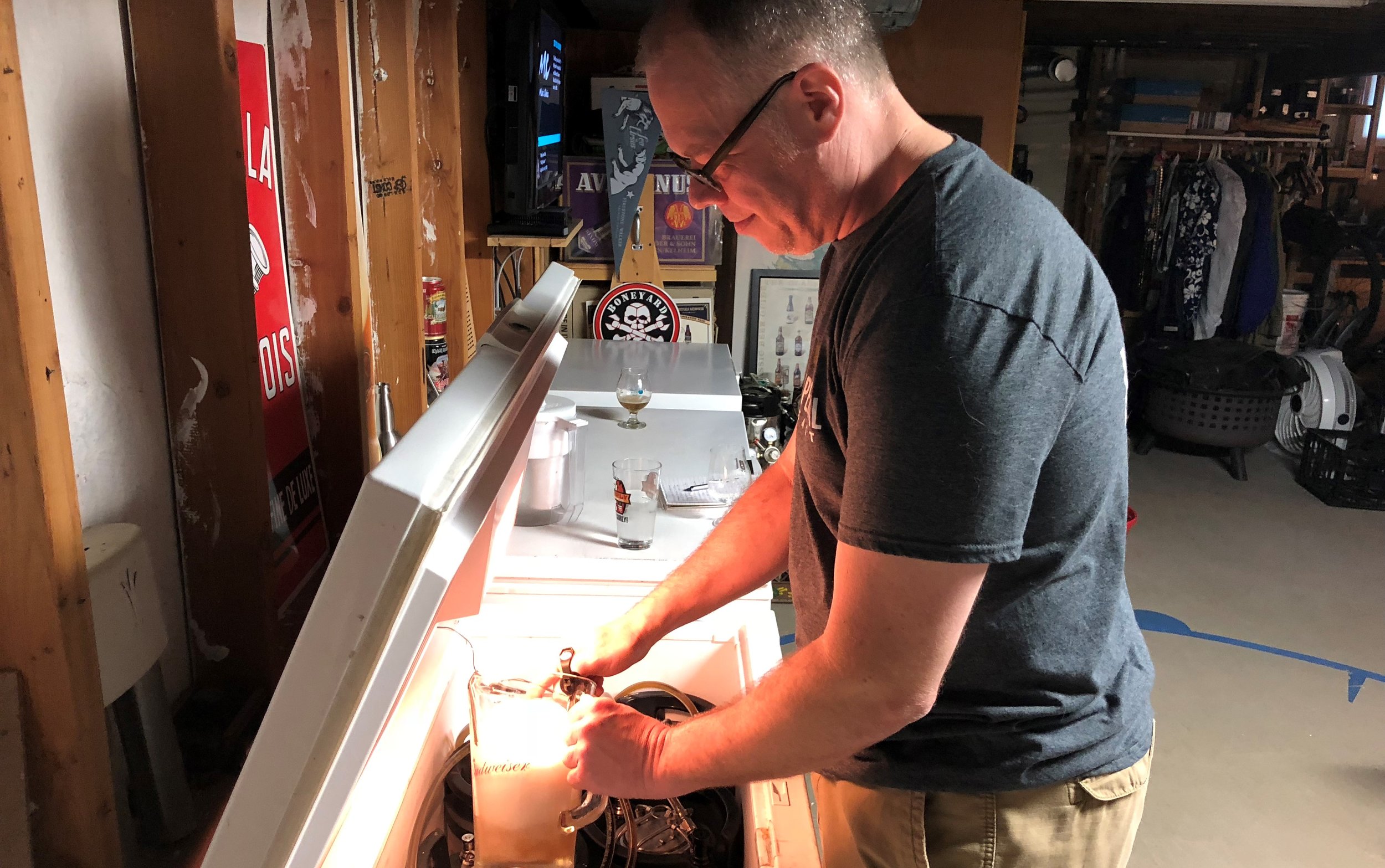Meet the Brewer: Rodney Kibzey
Photo provided by Rodney Kibzey
In June, Portland will become the center of the homebrewing universe, as Homebrew Con--the American Homebrewer Association's annual conference--visits Beervana. We spend a lot of time discussing the approaches and philosophies of commercial breweries, but I thought it would be nice to hear about some of our celebrated local homebrewers--whose beers are in many cases more forward-looking, accomplished, and interesting than what you find in your local brewpub.
Rodney Kibzey may be the most-decorated homebrewer in the United States. So far as I know, there's no way to confirm this either way, but consider: he recently completed a quest to medal in every state, he's won competitions in London and Canada, and he twice won the national Longshot competition sponsored by Sam Adams (He has so many ribbons and medals he can't display them all.)
I knew all of this before I visited him a couple weeks back, and as I descended the stairs into his Southeast Portland basement, I wondered what kind of brew kit I'd find. Some homebrewers have systems worth more than my car, replete with steel stands, pumps, conical fermenters--basically miniature commercial breweries. What would Rodney use?
Rodney's tour began, as most brewery tours do, with a trip to the bar for a beer. In his case, this means a choice from twelve kegs distributed across three coolers (!). These weren't mini-kegs, either; they were full five-gallon corny kegs, two full barrels of beer in all. I put myself in his hands, and he poured a British summer golden ale. It's a style I don't know much about--I've had fewer than ten examples in my life--but it was nutty with English malts with a delicate floral hop. An excellent first beer.
Born in Detroit, Rodney moved to Chicago after college. Beer came on his radar after a visit to Milwaukee with a girlfriend just after the turn of the century. "Hey, there's a brewery there," he said, discovering the landmark Miller brewery. He dug a little further. "Hey," he told his girlfriend, "there's another brewery there" (Lakefront). And another one--Sprecher. The same girlfriend later told him about homebrewing, and he was surprised to discover it was possible. ("You can make beer? In your bathtub?") By 2002, he was on his way.
One-third of the beers on offer.
We moved on to his helles before strolling over to see his system. I was shocked to see it was an incredibly basic set-up, not much more sophisticated than the one Patrick and I use. There's no tower, no pumps, no recirculation. He heats the water up in the mash tun, adds grain, and runs it off manually. Like most homebrewers, he regards the process as a problem to be solved, and has managed to add some refinements, like pre-chilling the water he runs through the wort-chiller, and then recapturing the warm water for use in the nearby washing machine. The steel mash tun allows for step-mashing, which he routinely uses, but that's about the extent of the whiz-bangery.
Where Rodney's real interest seems to lie is process and formulation. The helles we were drinking was made with a decoction mash (as was a dunkel he had on tap). Even more impressively, he recently made a pre-prohibition lager and used a cereal mash for the corn. I've never heard of a homebrewer using this technique, which is slow and laborious--for a fairly tiny benefit in the final beer. Rodney may not do it again either--it was apparently a nightmare, not just long and slow, but featuring the added joys of molten splatters of corn mash landing on exposed skin. The results were impressive, though; it was one of the best beers he poured all night.
“Judging homebrew competitions is an important part of the process. It taught me to investigate ingredients and styles.”
He favors traditional styles, though not always obvious ones. He had both a rauchbier and weizenbock on tap, and the weizenbock is one he brews regularly (and which has won numerous awards). The pre-prohibition lager and summer ale are other examples of traditional but obscure styles. His focus on process and recipe formulation are evident in the styles he had on tap (others: altbier, maibock), which succeed when the brewer is disciplined and careful. It's often the case that accomplished homebrewers make simpler styles as they gain experience because they recognize the work of their own hand more easily in them.
Which is not to say that his beers are entirely without surprise. On beer he has perfected is a Cedar IPA. It uses an aromatic variety of Spanish cedar, one that has a spicy tobacco-like quality. In problem-solving mode, Rodney figured out to cut the wood in narrow slats that would fit in the carboy, and he drilled holes in them for added surface area. The beer has an oily, woody quality that harmonizes nicely with the piney hops. I expected it to be one of those "interesting" beer that tastes good in small doses but which wears badly. The opposite was true. The woodiness is more pronounced in early sips, but then becomes an integrated flavor that encourages another sip.
He also knows how to excite the hearts of hopheads. He has been experimenting with cryo hops, and he poured out a pale ale that was absolutely saturated in hoppy aromas and flavors. It was creamy the way many hazy IPAs want to be (but often aren't) and had a head like mousse that continued to build and build.
We proceeded through the evening toward the weizenbock, and it was a wonderful nightcap. I see why it's won many awards. Full and dense on the palate, it somehow nevertheless leaves you with a crisp finish. The malts are nutty and wheaty, the yeast is spicy but only a bit fruity (good for a style full of so many sugars). The beers collectively formed a tour de force of diversity, and every beer we tried was well made and tasty. Rare is the brewpub with twelve taps as interesting or accomplished.
“The best thing to do when you get into homebrewing is joining a club. It’s worth its weight in gold.”
One of the ways Portland differs from other cities is the integration among homebrewers, professional brewers, and avid beer fans. The old guard of Portland brewing were mostly homebrewers, and folks like Rob Widmer and Alan Sprints (Hair of the Dog) have championed homebrewing from the start. (I actually learned how to all-grain brew when Alan taught a one-day course at Steinbart's here in town.) The Oregon Brew Crew, the state's oldest club, and the one to which Rodney belongs, has long been a critical foundation in education as well as supporting events like the Oregon Brewers Festival and pro-ams like SheBrew
Rodney arrived in Portland five years ago, and he was pretty quickly integrated into these three realms. His Cedar IPA was selected as Widmer Collaborator brew in 2014, and he has become active with the Brew Crew. I first met Rodney in the basement of writer Brian Yaeger, on one of his spontaneous bottle-share evenings. I was sitting next to Rodney and was drawn into conversation listening the depth of knowledge he had about brewing. Portland remains a pretty small city, and if you run in one of the niche communities like beer, you see the same faces around town time and again. Rodney has become one of those familiar faces, so you visit, keep your eyes peeled. There's a good chance you'll see him, and I highly recommend spending a few minutes talking homebrew with Rodney. You might even be tempted to try cereal mashing. (Despite his warnings, I am.)
If you are attending Homebrew Con in Portland next month, you'll also have an opportunity to see Rodney speak on Friday, June 29th at 11:30. He'll be discussing flavor profiles and recipe formulation. I'm guessing he'll even have some of his beer on hand. So go say hi--



